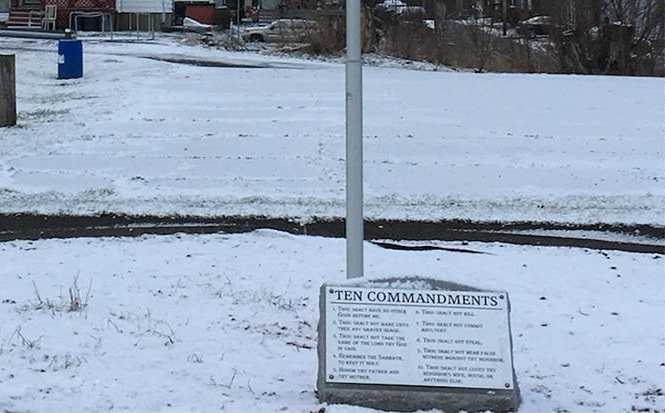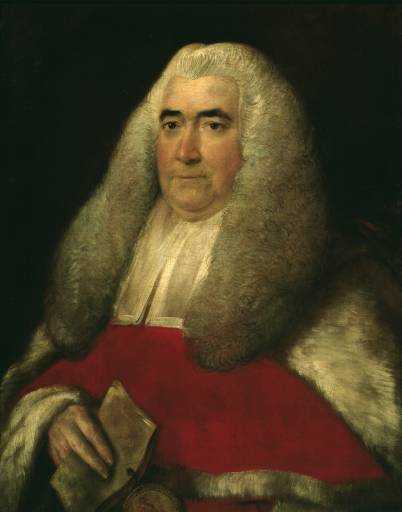
STEUBENVILLE, Ohio — Officials in a city in Ohio have removed a Ten Commandments plaque from a public park following receipt of a complaint from one of the nation’s most conspicuous Church-State separation groups.
According to reports, the Ten Commandments display in Steubenville’s Murphy Park had been placed after the Baptist church across the street adopted a section of the park. One local resident recently contacted the Wisconsin-based Freedom From Religion Foundation (FFRF) to complain.
In turn, the atheist-led organization wrote to the city manager of Steubenville to contend that the plaque, affixed to a small cement slab, is unconstitutional.
“This Ten Commandments display violates the Establishment Clause of the First Amendment,” the letter read. “… Given the content of the display and the fact that the Ten Commandments originally appeared as a lone display, a reasonable observer would view it as an endorsement of religion by the City.”
“By placing this display in a public park, the City of Steubenville is unmistakably sending the message that it gives the display its stamp of approval,” FFRF asserted.
It added that that even as a matter of policy, the Ten Commandments shouldn’t be displayed on government property as it prohibits the worship of other gods.
“The government has no business telling citizens which God they must have, or that they must have any God at all,” the letter claimed.
It asked that the decalogue plaque be moved to private property, such as the church across the street.
On Aug. 14, City Manager Jim Mavromatis announced at a city hall meeting that the plaque would be relocated.
“Mavromatis reported the city will have to remove a Ten Commandments plaque from Murphy Field as a result of a warning letter from the Freedom From Religion Foundation of Madison, Wis.,” a report from the Herald-Star outlines. “The plaque was provided by a church neighboring the park. Mavromatis noted the group is the same one that opposed a crucifix representing the Franciscan University of Steubenville as part of a proposed city seal several years ago.”
FFRF has cheered the removal, stating that “[r]emoving the Bible plaque ensures that Murphy Park can be a welcoming space to all citizens.”
As previously reported, earlier this year, a courthouse in Minnesota removed a plaque outlining God’s laws following a complaint from FFRF. Officials in Lovingston, Virginia also similarly voted to temporarily cover a plaque that read “Keep God’s Commandments” after the atheist group lodged a complaint.
However, a mayor in Tennessee rather decided to defy FFRF last July after the group requested that a Scripture posted to the walls of the Henderson County Courthouse in Lexington be removed.
“Our community is based on the belief of a true and living God,” Mayor Dan Hughes declared.

As previously reported, for over 100 years in early America, those in the legal profession often looked to British judge William Blackstone’s “Commentaries on the Laws of England,” which regularly pointed to God’s Law as the foundation for civil and criminal law.
“Considering the Creator only as a being of infinite power, He was able unquestionably to have prescribed whatever laws He pleased to His creature, man …, ” Blackstone wrote in 1753. “But as He is also a being of infinite wisdom, He has laid down only such laws as were founded in those relations of justice, that existed in the nature of things antecedent to any positive precept. These are the eternal, immutable laws of good and evil, to which the Creator Himself in all His dispensations conforms; and which He has enabled human reason to discover, so far as they are necessary for the conduct of human actions.”
“Such among others are these principles: that we should live honestly, should hurt nobody, and should render to everyone its due; to which three general precepts Justinian has reduced the whole doctrine of law,” he stated.
“If man were to live in a state of nature, unconnected with other individuals, there would be no occasion for any other laws, than the law of nature and the law of God. Neither could any other law possibly exist, for a law always supposes some superior who is to make it; and in a state of nature we are all equal, without any other superior but Him who is the Author of our being.”
Become a Christian News Network Supporter...


